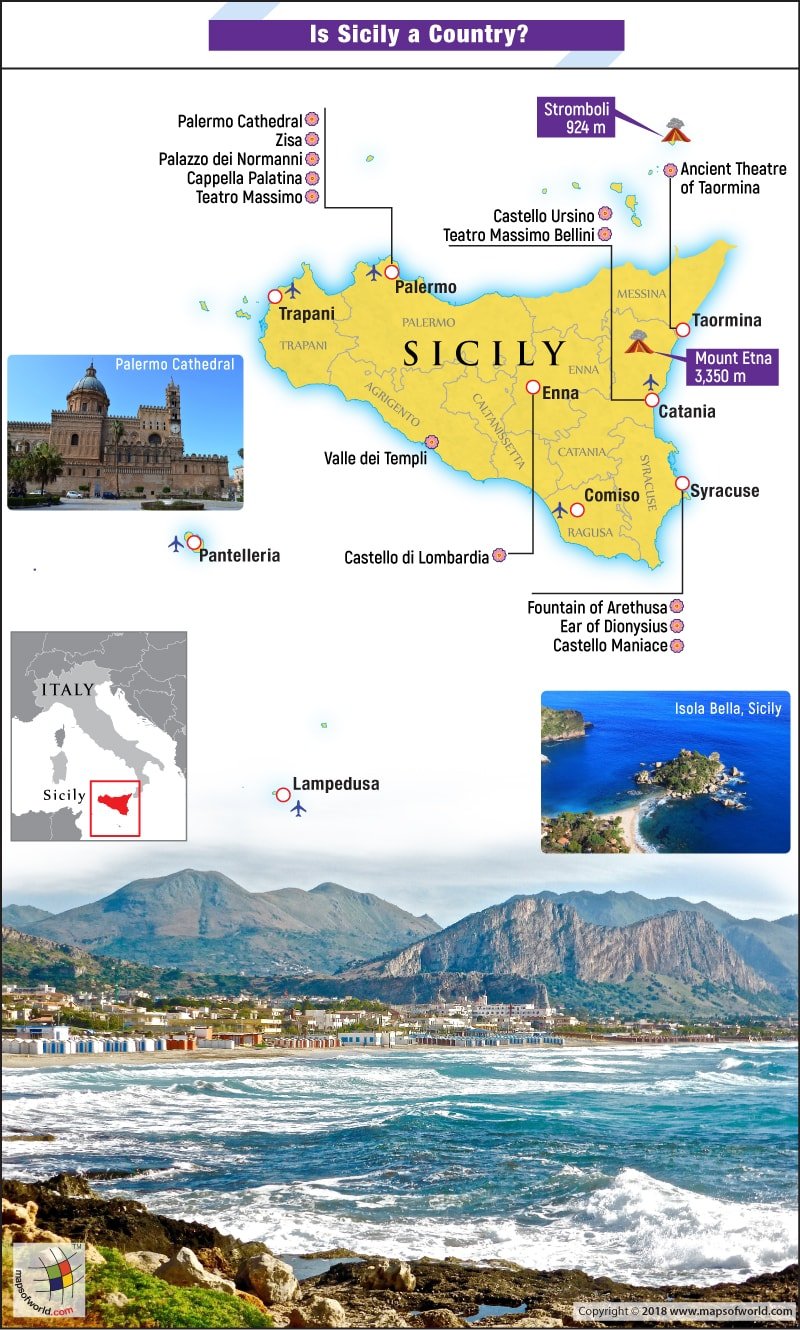Is Sicily a Country?

Sicily is the largest island in the Mediterranean Sea. It covers an area of 9,926 square miles. The island is separated from mainland Italy by the Strait of Messina on the southern side of the country. In this article, we will explore “Is Sicily a country”, “where is Sicily”, and more.
Sicily a Country?
No, Sicily is not a country. It is an autonomous region of Italy, meaning it has its own government and some degree of self-governance, but it is ultimately part of the nation of Italy. Sicily is believed to have had a thriving ecosystem which has degraded over time with subsequent generations.
Why Was Sicily Granted Autonomy?
For many years, Sicily was ruled by different outside powers, which caused tensions between Sicily and the Italian government. Because of Sicily’s special culture and history, people there wanted more control over their own affairs. In 1946, after a period of unrest, the Italian government made a special set of rules called the Special Statute. These rules gave Sicily a level of autonomy within Italy.
Where is Sicily?
Sicily is located at the bottom tip of Italy. It’s surrounded by different parts of the Mediterranean Sea called the Ionian, Tyrrhenian, and Mediterranean Seas. Sicily has lots of different landscapes, like big mountains, flat plains where plants grow well, and beautiful beaches along the coast.
What Separates Sicily from Italy?
Following are the aspects that set Sicily apart from mainland Italy:
- Geographical Separation
The Strait of Messina is the canal that separates Sicily from mainland Italy. It’s only about 3 kilometers (1.9 miles) wide at its narrowest point. Even though it’s really close, the strait has strong currents and is important historically, which makes it a significant barrier between Sicily and Italy. - Cultural Distinctions
Throughout thousands of years, Sicily has become its own special place with its own way of living. This is because many different civilizations including the Greeks, Romans, Arabs, Normans, and Spanish have influenced Sicily’s language, food, and customs. You can see this difference when comparing Sicily to the rest of Italy. - Autonomous Status
Even though Sicily is part of Italy, it has its own local government and way of running things. This means that Sicily can make some decisions on its own, separate from the main government of Italy, thanks to its Special Statute.
Capital of Sicily
Palermo is the capital city of Sicily. It is located on the northern coast of the island. With a population of approximately 676,000 people and an area of around 158 square kilometers (61 square miles), it is the largest city in Sicily and one of the largest in Italy.
Interesting Facts
- In 2015, they named Palermo the Street Food Capital of Europe.
- In Palermo, there is a lively tradition of puppet theater. These shows feature puppets wearing fancy clothes and telling stories from old tales and history.
Interesting Facts about Sicily
- Europe’s tallest and most active volcano is in the eastern part of the island.
- Sicily has some of the best-preserved Greek temples outside of Greece.
- Sicily has a rich history dating back thousands of years. Back then, it was a big deal for trade and people living there. Places like Syracuse, Selinunte, and Segesta were super important in the past and had a big impact on the history of the Mediterranean area.
- Sicily is a major producer of pistachios.
- The brilliant mathematician and inventor Archimedes was from Sicily.
- While Italian is the official language, Sicily has its own dialect, “Siciliano.
Related Links
